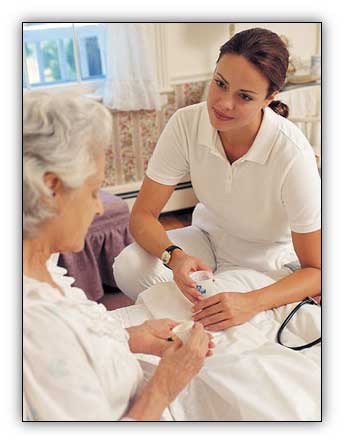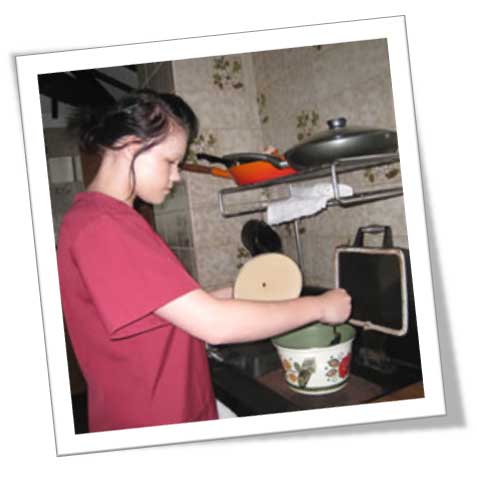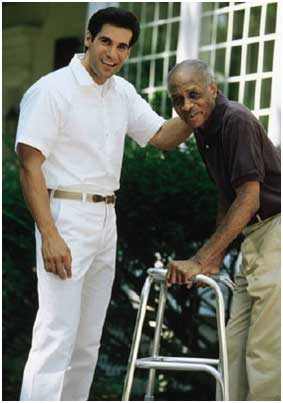 The Home Health Aide
The Home Health Aide The Home Health Aide
The Home Health AideYou must participate in class discussions in the Discussion Board. This is a state requirement. You cannot pass the course without taking part in the Discussion Board.
Please read all the material below. There is no text book for this course. All information is in the online materials. Read all of the lessons and keep track of the hours you spend on this course. You will be asked for your total hours when you fill out the Course Evaluation at the end of the class.
The following link is a short YouTube video that will give you an overview of a Home Health Aide's duties.
The Home Health Care Team works with physicians to bring modern home health to patients in the comfort of their home. Home care delays or eliminates the need for care in a hospital or long-term care facility, provides preventive medicine, and is typically less costly than inpatient care. It encourages a high degree of participation from the patient and/or family member receiving care. Receiving care at home brings rest and reassurance to patients and their loved ones. Home Health Agencies must be licensed with the state.
Services offered to home health patients include:
Referrals and requests for services are accepted from family members, patients, hospitals, nursing homes, physician offices, and clinics and community agencies. A doctor's order is needed before home health services can begin.
Functions of the Home Health Aide may include many duties as outlined in the care plan. Some of these functions are:
 Measure and record intake and output.
Measure and record intake and output. Do only what and exactly what your case manager instructs you to do! There are some situations you should recognize and avoid.
A successful aide possesses good organizational skills. An aide must manage time well to be able to complete all the tasks required in an allotted shift. The instructions may include light housekeeping, laundry and ironing, meal preparation, shopping/running errands, and personal care of the client. The aide will have to decide the best way to plan each day's activities. This will require flexibility, practical judgment, and time organization. Some pitfalls to avoid are:
An aide's job is to make the family comfortable and to assist them, not to change their lifestyle. Remember, as a Home Health Aide, you are a guest in the client's home.
Everyone should follow the golden rule - treat others as you would like to be treated. This helps to establish good interpersonal relationships.
 Client's Rights
Client's Rights As an employee of an agency or your client, you also have rights. Examples of your rights are:
As you have been taught as a CNA, you know confidentiality is very important. A few of your clients might live in a senior high-rise, and often clients are curious about who else in the building has a Home Health Aide, or what is wrong with that person. You are not allowed to tell another client that you are even caring for someone else in the building. You might suggest your client to talk to his or her neighbor to find out the information.
HIPAA (Health Insurance Portability and Accountability Act) went into effect in April 2003. This act mandates that all of your client’s health information-oral, paper or electronic- be protected and confidential. If records are in your car, make sure the car is locked, and that information is not visible, when you leave it. Keep all records secure at all times.
I would like to add to the presentation regarding stress. Stress is a big issue for everyone. We should learn all we can on how to deal with stress and how to help our clients deal with stress. Please read this commentary.
 Recognizing Stress
Recognizing StressWhich of these is stress?
All of these are stress!
If you are used to thinking that stress is something that makes you worry, you have the wrong idea of stress. Stress is many different kinds of things: happy things, sad things, allergic things, physical things. Many people carry enormous stress loads and they do not even realize it!
What is stress?
We are all familiar with the word "stress". Stress is when you are worried about getting laid off your job, or worried about having enough money to pay your bills, or worried about your mother when the doctor says she may need an operation. In fact, to most of us, stress is synonymous with worry. If it is something that makes you worry, then it is stress.
Your body, however, has a much broader definition of stress. To your body, stress is synonymous with change. Anything that causes a change in your life causes stress. It doesn't matter if it is a "good" change, or a "bad" change, they are both stress. When you find your dream apartment and get ready to move, that is stress. If you break your leg, that is stress. Good or bad, if it is a CHANGE in your life, it is stress as far as your body is concerned.
Even imagined change is stress. (Imagining changes is what we call "worrying"). If you fear that you will not have enough money to pay your rent, that is stress. If you worry that you may get fired, that is stress. If you think that you may receive a promotion at work, that is also stress (even though this would be a good change). Whether the event is good or bad, imagining changes in your life is stressful.
Let us look at several types of stress -- ones that are so commonplace that you might not even realize that they are stressful.
Puberty
The vast hormonal changes of puberty are severe stressors. A person's body actually CHANGES shape, sexual organs begin to function, and new hormones are released in large quantities. Puberty, as we all know, is very stressful.
Pre-Menstrual Syndrome
Once a woman passes puberty, her body is designed to function best in the presence of female hormones. For women past puberty, a lack of female hormones is a major stress on the body. Once a month, just prior to menstruation, a woman's hormone levels drop sharply. In many women, the stress of sharply falling hormones is enough to create a temporary OVERSTRESS. This temporary OVERSTRESS is popularly known as Pre-Menstrual Syndrome (PMS).
Post-Partum
Following a pregnancy, hormone levels CHANGE dramatically. After a normal childbirth, or a miscarriage, some women may be thrown into OVERSTRESS by loss of the hormones of pregnancy.
Menopause
There is another time in a woman's life when hormone levels decline. This is the menopause. The decline in hormones during menopause is slow and steady. Nevertheless, this menopausal decline causes enough stress on the body to produce OVERSTRESS in many women.
Taking Responsibility for Another Person's Actions
When you take responsibility for another person's actions, CHANGES occur in your life over which you have little or no control. Taking responsibility for another person's actions is a major stressor.
Allergic Stress
Allergic reactions are a part of your body's natural defense mechanism. When confronted with a substance which your body considers toxic, your body will try to get rid of it, attack it, or somehow neutralize it. If it is something that lands in your nose, you might get runny eyes and sneeze. If it lands on your skin, you might get blistery skin. If you inhale it, you'll wheeze. If you eat it, you may break out in itchy red hives all over your body. Allergic reactions are a definite stress, requiring large changes in energy expenditure on the part of your body's defense system to fight off what the body perceives as a dangerous attack by an outside toxin.
Stress Scale for Adults
In the following table you can look up representative changes in your life and see how much stress value each of these changes is adding to your life. Note any item that you may have experienced in the last twelve months. Then, total up your score.
(Adapted from the "Social Readjustment Rating Scale" by Thomas Holmes and Richard Rahe. This scale was first published in the "Journal of Psychosomatic Research", Copyright 1967, vol.II p. 214. It is used by permission of Pergamon Press, Ltd.)
STRESS |
EVENT VALUE |
DEATH OF SPOUSE |
100 |
DIVORCE |
60 |
MENOPAUSE |
60 |
SEPARATION FROM LIVING PARTNER |
60 |
JAIL TERM OR PROBATION |
60 |
DEATH OF CLOSE FAMILY MEMBER OTHER THAN SPOUSE |
60 |
SERIOUS PERSONAL INJURY OR ILLNESS |
45 |
MARRIAGE OR ESTABLISHING LIFE PARTNERSHIP |
45 |
FIRED AT WORK |
45 |
MARITAL OR RELATIONSHIP RECONCILIATION |
40 |
RETIREMENT |
40 |
CHANGE IN HEALTH OF IMMEDIATE FAMILY MEMBER |
40 |
WORK MORE THAN 40 HOURS PER WEEK |
35 |
PREGNANCY OR CAUSING PREGNANCY |
35 |
SEX DIFFICULTIES |
35 |
GAIN OF NEW FAMILY MEMBER |
35 |
BUSINESS OR WORK ROLE CHANGE |
35 |
CHANGE IN FINANCIAL STATE |
35 |
DEATH OF A CLOSE FRIEND (not a family member) |
30 |
CHANGE IN NUMBER OF ARGUMENTS WITH SPOUSE OR LIFE PARTNER |
30 |
MORTGAGE OR LOAN FOR A MAJOR PURPOSE |
25 |
FORECLOSURE OF MORTGAGE OR LOAN |
25 |
SLEEP LESS THAN 8 HOURS PER NIGHT |
25 |
CHANGE IN RESPONSIBILITIES AT WORK |
25 |
TROUBLE WITH IN-LAWS, OR WITH CHILDREN |
25 |
OUTSTANDING PERSONAL ACHIEVEMENT |
25 |
SPOUSE BEGINS OR STOPS WORK |
20 |
BEGIN OR END SCHOOL |
20 |
CHANGE IN LIVING CONDITIONS (visitors in the home, change in roommates, remodeling house) |
20 |
CHANGE IN PERSONAL HABITS (diet, exercise, smoking, etc.) |
20 |
CHRONIC ALLERGIES |
20 |
TROUBLE WITH BOSS |
20 |
CHANGE IN WORK HOURS OR CONDITIONS |
15 |
MOVING TO NEW RESIDENCE |
15 |
PRESENTLY IN PRE-MENSTRUAL PERIOD |
15 |
CHANGE IN SCHOOLS |
15 |
CHANGE IN RELIGIOUS ACTIVITIES |
15 |
CHANGE IN SOCIAL ACTIVITIES (more or less than before) |
15 |
MINOR FINANCIAL LOAN |
10 |
CHANGE IN FREQUENCY OF FAMILY GET-TOGETHERS |
10 |
VACATION |
10 |
PRESENTLY IN WINTER HOLIDAY SEASON |
10 |
MINOR VIOLATION OF THE LAW |
5 |
Total Score ___________________________
Stress Scale for Youth
STRESS |
EVENT VALUE |
DEATH OF SPOUSE, PARENT, BOYFRIEND/GIRLFRIEND |
100 |
DIVORCE (of yourself or your parents) |
65 |
PUBERTY |
65 |
PREGNANCY (or causing pregnancy) |
65 |
MARITAL SEPARATION OR BREAKUP WITH BOYFRIEND/GIRLFRIEND |
60 |
JAIL TERM OR PROBATION |
60 |
DEATH OF OTHER FAMILY MEMBER (other than spouse, parent or boyfriend/girlfriend) |
60 |
BROKEN ENGAGEMENT |
55 |
ENGAGEMENT |
50 |
SERIOUS PERSONAL INJURY OR ILLNESS |
45 |
MARRIAGE |
45 |
ENTERING COLLEGE OR BEGINNING NEXT LEVEL OF SCHOOL (starting junior high or high school) |
45 |
CHANGE IN INDEPENDENCE OR RESPONSIBILITY |
45 |
ANY DRUG AND/OR ALCOHOL USE |
45 |
FIRED AT WORK OR EXPELLED FROM SCHOOL |
45 |
CHANGE IN ALCOHOL OR DRUG USE |
45 |
RECONCILIATION WITH MATE, FAMILY OR BOYFRIEND/GIRLFRIEND (getting back together) |
40 |
TROUBLE AT SCHOOL |
40 |
SERIOUS HEALTH PROBLEM OF A FAMILY MEMBER |
40 |
WORKING WHILE ATTENDING SCHOOL |
35 |
WORKING MORE THAN 40 HOURS PER WEEK |
35 |
CHANGING COURSE OF STUDY |
35 |
CHANGE IN FREQUENCY OF DATING |
35 |
SEXUAL ADJUSTMENT PROBLEMS (confusion of sexual identity) |
35 |
GAIN OF NEW FAMILY MEMBER (new baby born or parent remarries or adopts) |
35 |
CHANGE IN WORK RESPONSIBILITIES |
35 |
CHANGE IN FINANCIAL STATE |
30 |
DEATH OF A CLOSE FRIEND (not a family member) |
30 |
CHANGE TO A DIFFERENT KIND OF WORK |
30 |
CHANGE IN NUMBER OF ARGUMENTS WITH MATE, FAMILY OR FRIENDS |
30 |
SLEEP LESS THAN 8 HOURS PER NIGHT |
25 |
TROUBLE WITH IN-LAWS OR BOYFRIEND'S OR GIRLFRIEND'S FAMILY |
25 |
OUTSTANDING PERSONAL ACHIEVEMENT (awards, grades, etc.) |
25 |
MATE OR PARENTS START OR STOP WORKING |
20 |
BEGIN OR END SCHOOL |
20 |
CHANGE IN LIVING CONDITIONS (visitors in the home, remodeling house, change in roommates) |
20 |
CHANGE IN PERSONAL HABITS (start or stop a habit like smoking or dieting) |
20 |
CHRONIC ALLERGIES |
20 |
TROUBLE WITH THE BOSS |
20 |
CHANGE IN WORK HOURS |
15 |
CHANGE IN RESIDENCE |
15 |
CHANGE TO A NEW SCHOOL (other than graduation) |
10 |
PRESENTLY IN PRE-MENSTRUAL PERIOD |
15 |
CHANGE IN RELIGIOUS ACTIVITY |
15 |
GOING IN DEBT (you or your family) |
10 |
CHANGE IN FREQUENCY OF FAMILY GATHERINGS |
10 |
VACATION |
10 |
PRESENTLY IN WINTER HOLIDAY SEASON |
10 |
MINOR VIOLATION OF THE LAW |
5 |
Total Score _____________________________________
We have asked you to look at the last twelve months of changes in your life. This may surprise you. It is crucial to understand, however, that a major change in your life has effects that carry over for long periods of time. It is like dropping a rock into a pond. After the initial splash, you will experience ripples of stress. And these ripples may continue in your life for at least a year.
 So, if you have experienced total stress within the last twelve months of 250 or greater, even with normal stress tolerance, you may be OVERSTRESSED. Persons with Low Stress Tolerance may be OVERSTRESSED at levels as low as 150.
So, if you have experienced total stress within the last twelve months of 250 or greater, even with normal stress tolerance, you may be OVERSTRESSED. Persons with Low Stress Tolerance may be OVERSTRESSED at levels as low as 150.
OVERSTRESS will make you sick. Carrying too heavy a stress load is like running your car engine past the red line, or leaving your toaster stuck in the "on" position, or running a generator past maximum permissible power. Sooner or later, something will break, burn up, or melt down.
What breaks depends on where the weak links are in your physical body. And this is largely an inherited characteristic.
Here are the common "weak links" and the symptoms of their malfunction.
We have known for a long time that OVERSTRESS could cause physical damage to the gastrointestinal tract, glandular system, skin or cardiovascular system. But only recently have we learned that OVERSTRESS actually causes physical changes in the brain. One of the most exciting medical advances of our decade has been an understanding of how OVERSTRESS physically affects your brain. We now know that the fatigue, aches and pains, crying spells, depression, anxiety attacks, and sleep disturbances of OVERSTRESS are caused by brain CHEMICAL MALFUNCTION.
-----Reduce the pace of change in your life.
-----Reduce the social obligations.
-----Reduce work or school obligations.
-----Postpone changes in your living situation
-----Say "No" more often, and don't be afraid to ask for help.
-----Eliminate possible food or environmental allergens.
-----Reduce environmental toxins.
-----Get enough sleep, and make sure you have a restful sleeping environment. Stay away from bright electronic screens at least an hour before bedtime.
-----Diet: Take a multivitamin, mineral, or trace element preparation; stabilize your blood sugar; eat more fresh vegetables.
-----Exercise: Twenty minutes to two hours, a minimum of three times a week.
-----Stop Your Pick-Me-Ups (coffee, energy drinks--consult your physician as needed)
-----Stop Your Put-Me-Downs (sleeping pills, anxiety medications--consult your physician)
-----Exercise
-----Recreational reading/audio books, arts, crafts, music
-----Dance
-----Meditation
-----Yoga
-----Biofeedback
-----Self-Hypnosis
-----Religious counseling or prayer
-----Set regular sleep times
-----Avoid time zone shifts or rapid changes in your work shift
-----Use daylight spectrum fluorescent lights to set your body clock's "awake time".
-----Check for hidden illness
-----Obtain help with self relaxation and general psychological counseling.
-----Have your doctor prescribe for you a brain chemical re-balancer
I would like to add to the presentation that most accidents occur at home and many of them are preventable, so it is important that your client’s home is as safe as possible. Most accidents occur in the bedroom or bathroom. According to the National Safety Council, at least 4 million people are injured each year in home accidents. This means that about 1 person in 50 suffers some kind of injury as a result of an accident that occurs in the home. Here are some helpful tips.
 Bathroom Safety
Bathroom Safety As a CNA you learned about fire safety. I would like to refresh your mind on the procedure below. Do you remember the word RACE?
Always remember: client safety and your safety is the first thing you should consider!
Watch the following slideshows.
Remember, no one is in the home to monitor your infection control or safety efforts. You must develop a code of ethics to uphold these matters even when alone and no one is watching. It is your responsibility to keep yourself and the client as safe as possible.
Click into Labs to play games and test your knowledge of Infection Control.